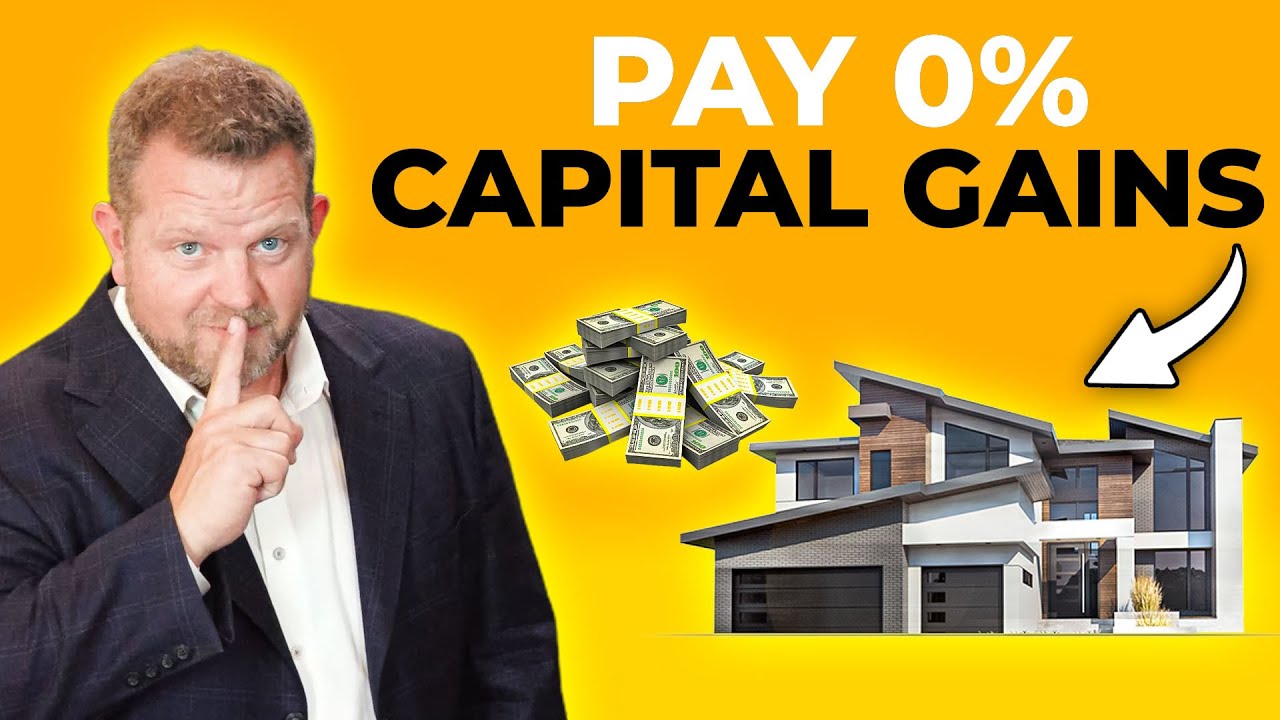Navigating the intricacies of capital gains tax on real estate isn’t for the faint of heart. It’s a critical element in the real estate arena that can significantly affect your financial standing. Whether you’re flipping houses or selling your family home after years of living there, understanding how this tax applies to your situation can save you a chunk of change—money that can be reinvested. This article dives deep into capital gains tax, examining the details you need to know as a homeowner or investor.

What is Capital Gains Tax on Real Estate?
At its core, capital gains tax on real estate is a tax on the profits from the sale of property. It’s essential because it directly impacts how much money you actually take home after a sale. When you sell a property for more than you paid, that profit—and yes, it can feel like hitting the jackpot—is considered a capital gain. But beware! Not all capital gains are treated equally; there are short-term and long-term capital gains.
Short-term capital gains occur on properties held for less than one year, while long-term capital gains apply to properties held for over a year. The capital gains tax rate fluctuates depending on how long you’ve owned the property. As of 2026, the short-term capital gains tax rate matches your ordinary income tax rate, which can be quite steep if you’re earning a hefty paycheck. In contrast, the long-term capital gains tax rate, usually much more favorable, can range from 0% to 20% depending on your income level and filing status. Understanding these distinctions helps you craft a savvy investment strategy.

The Different Types of Capital Gains Tax: A Breakdown
Short Term Capital Gains Tax
Short-term capital gains tax comes into play when you sell a property after holding it for less than one year. This scenario is common among real estate investors flipping homes for quick profits. As of 2026, the short-term capital gains tax could hit you with rates equivalent to your ordinary income—anywhere from 10% to 37%!
Take, for instance, an investor flipping a home in Los Angeles. After purchasing a fixer-upper for $500,000 and selling it six months later for $800,000, their profit would be $300,000. If this investor falls into a 32% tax bracket, they’d owe around $96,000 in taxes on that gain—ouch! This example starkly highlights how the short-term capital gains tax can eat into your hard-earned profits.
Long Term Capital Gains Tax
Switching to the long-term capital gains tax, this tax kicks in when you’ve owned a property for over one year. The upside? Holding onto your property can yield tax benefits that can save you big bucks. The long-term capital gains tax rate is far friendlier, usually ranging from 0% to 20%, depending on your income bracket.
Consider a couple that’s held their family home for ten years. They bought it for $400,000 and sold it for $800,000. Their capital gain amounts to $400,000. If they fall within the 15% long-term capital gains tax bracket, they would owe $60,000 in taxes—far less than what they’d pay if they had flipped the property. The difference in holding time here clearly illustrates how strategic timing can significantly alter tax outcomes.

The Impact of Long Term Gains Tax on Real Estate Investments
Long-term capital gains tax isn’t just a buzzkill; it can directly affect your investment strategy. One significant way to minimize tax liability is by focusing on long-term investments. Historically, real estate provides substantial returns, and the long-term capital gains tax rate makes those gains even sweeter.
It’s enlightening to look back at places like Seattle and Austin, where appraisal values have consistently risen over the years. Investors holding their properties through market fluctuations generally find themselves in healthier financial situations, having minimized their tax burden while maximizing property appreciation. Think of it this way: holding your assets can help you leverage more significant returns—and who doesn’t want that?

Case Studies: Real-World Implications of Capital Gains Tax
Let’s consider a couple of real-world scenarios that illustrate the implications of capital gains tax.
These examples reflect how capital gains tax can operatively tie into different financial outcomes based on personal circumstances.

Navigating Changes in Capital Gains Tax Rates
Changes are inevitable, especially in tax law. Recent legislative shifts (2023-2026) have put capital gains tax back in the spotlight. As political climates change, so do projected rates. Investors must keep an eye on these developments.
Experts predict that current tax structures may evolve, potentially increasing the long-term capital gains tax rate. With looming debates about wealth inequality and tax reform, it pays to stay informed. As seasoned investors know, advance planning can mitigate surprises. Keeping tabs on potential changes to the withholding tax can help you evaluate your options as the landscape shifts.
How to Strategically Manage Your Capital Gains Tax Liability
Getting savvy about managing your capital gains tax liability is crucial for any real estate investor. One effective strategy is timing your sales judiciously. If you’re looking at quick flips, do your homework to see if waiting a few months might put you in a more favorable tax bracket.
Consider utilizing 1031 exchanges. This tax deferment strategy allows you to reinvest your gains into a similar property without immediately incurring a tax liability. It’s a powerful way to grow your investment portfolio without the sting of high taxes every time you sell.
Additionally, tax-loss harvesting can help offset some of your capital gains. By selling underperforming assets at a loss, you can counterbalance the taxes you’d owe on your profitable investments. Real-world examples abound where investors have used this strategy to turn potential losses into strategic moves that enhance their overall financial health.
The Future of Capital Gains Tax on Real Estate: Trends to Watch
The future of capital gains tax seems to be in a state of flux. As property values continue to climb, investors should anticipate how that affects their tax responsibilities. Notably, technology influences real estate investments; platforms that analyze market trends and predict appreciation can be game-changers.
Investors must adapt to how these innovations can shape their next moves. Keep an ear to the ground regarding changes in capital gains tax laws. Awareness will prepare you for potential adjustments in the decade to come.
Unique Perspectives on Capital Gains Tax Impact
Capital gains tax systems don’t exist in a vacuum. They often reflect socio-economic inequalities where low-to-middle-class homeowners may bear a heavier burden compared to affluent investors. Addressing these disparities could lead to a more equitable tax landscape.
This tax policy can also shape urban development. Areas showing rapid appreciation often benefit from investments in infrastructure and community services. For homeowners and investors, this creates a ripple effect where real estate development not only boosts property values but can also tie back to local economies.
As for policy changes, perhaps simplifying the capital gains tax process would promote more investment and reward long-term holding strategies. Streamlining these complexities can make investing more accessible.
Final Thoughts: Preparing for the Future of Real Estate Investment
There’s no denying that capital gains tax on real estate plays a big role in shaping investor success. Its intricacies demand attention and strategic planning. By being aware of long-term versus short-term gains, knowing current tax rates, and watching for legislative changes, you can prepare yourself for financial growth in an unstable environment.
Planning your real estate investment strategy with these factors in mind means positioning yourself to thrive. Always stay informed and be ready to pivot. The real estate world is full of opportunities; maximize them by mastering your understanding of capital gains tax. It could very well be the ticket to your financial freedom, allowing you to leverage your assets for a brighter future.
Whether it’s flipping properties or holding a family home for years, understanding and navigating capital gains tax on real estate can lead to remarkable outcomes. Don’t shy away from seeking expert advice or using resources available through reputable platforms like Woodforests Bank or simply visiting Mortgage Rater for better insights. Now’s the time to invest wisely and prepare for the future!
Capital Gains Tax on Real Estate: Engaging Trivia and Interesting Facts
Understanding Capital Gains Tax
Did you know that the capital gains tax on real estate can be a hefty sum? In the U.S., property owners can face a tax of up to 20% on profits from the sale of their homes. That’s not small change! To put this into perspective, imagine selling your house for $400,000 after buying it for $250,000. You’re looking at a capital gain of $150,000. Now, toss in the capital gains tax, and you might think twice before pulling the trigger on that sale. Speaking of big numbers, it’s fascinating to consider that Conor McGregor’s net worth is a testament to how quickly fortunes can grow, making one think about how property values can skyrocket in a hot market.
The Role of Primary Residences
Now, here’s a fun tidbit: If you’re selling your primary residence, you might qualify for an exclusion of up to $250,000 from the gain, or $500,000 for married couples filing jointly. This could be a game changer! For example, if you bought your home at the right spot in Country Club hills, you might enjoy some serious savings come tax time. And just like a contestant on the Amazing Race 2025, navigating these financial hurdles can lead to a treasure trove of benefits if you know where to look. Understanding these exemptions can make your selling experience a lot less stressful.
Investing and Taxes
Thinking of investing in real estate? Capital gains tax on real estate doesn’t just apply to personal homes. Investors entering the market often overlook the costs associated with selling. It’s crucial to educate oneself on these taxing matters to avoid surprises down the line. You might want to check out the best dental Plans to supplement your budget, especially if unexpected expenses crop up! Just like how the Oakmont Country club is known for its exclusivity, being savvy with real estate properties can set you apart from the ordinary investor. So, arm yourself with the right knowledge before diving into property flipping; it’ll serve you well in the long run!



